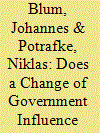| Srl | Item |
| 1 |
ID:
175311


|
|
|
|
|
| Summary/Abstract |
We examine whether changes of government influence compliance with international agreements. We investigate compliance with the NATO two percent target to which all NATO countries committed themselves during the NATO summit in Wales in 2014. The dataset includes the military expenditure by NATO countries over the period 2010–2018. The results suggest that countries that do not (yet) comply with the two percent target have smaller growth rates in military expenditure relative to GDP when they experienced a large change of government, e.g. a change from a rightwing to a leftwing government, than countries that did not experience such a large change of government since the NATO summit in 2014. Countries that experienced a large change of government are, thus, less likely to comply with the two percent target. Future research should examine the credibility problem of national governments in other international agreements too.
|
|
|
|
|
|
|
|
|
|
|
|
|
|
|
|
| 2 |
ID:
172771


|
|
|
|
|
| Summary/Abstract |
In many European countries established leftwing and rightwing parties have been threatened by policy convergence and, in turn, new populist parties that offer more polarized platforms. I investigate whether government ideology influences dragnet-controls – controls of persons conducted by the police without having any suspicion that the controlled person committed a crime. They took effect after the Schengen Agreement in 1995. I propose dragnet-controls to be a prime example of ideology-induced policies implemented by established parties. Dragnet-controls confine citizens’ liberties, but may help to detect criminals. Using data from the 16 German states over the period 1995–2017, I show that rightwing governments have been active in implementing dragnet-controls and leftwing governments have denied dragnet-controls since the mid 1990s. When evaluating how government/party ideology influences individual policies, previous econometric studies ignored initiatives in parliament. My study also considers initiatives in parliament. I conjecture that, since 2015, the rightwing CDU has used initiatives to introduce/extend dragnet-controls to also deal with the upcoming threat of rightwing populism. Future research should examine policy-differences between the established parties regarding more fine-grained policy measures also in other European countries.
|
|
|
|
|
|
|
|
|
|
|
|
|
|
|
|
| 3 |
ID:
144787


|
|
|
|
|
| Summary/Abstract |
We examine whether government ideology was correlated with the growth in military expenditure in Germany over the period 1951–2011. Using various measures of government ideology, the results do not show any effect. The exception is an ideology measure based on the Comparative Manifesto Project (left-right scale): using this measure, the results show that the growth in military expenditure increased by about 2.4 percentage points, when the ideology variable (right-wing) increased by one standard deviation. This effect, however, is based on observations until the early 1960s and cannot be generalized. The major political parties agreed on how to evaluate international risks and threats. Government ideology retired to the background. We conjecture that the consensus among the major parties will persist – even if military spending needs to be increased in response to new international risks and threats.
|
|
|
|
|
|
|
|
|
|
|
|
|
|
|
|